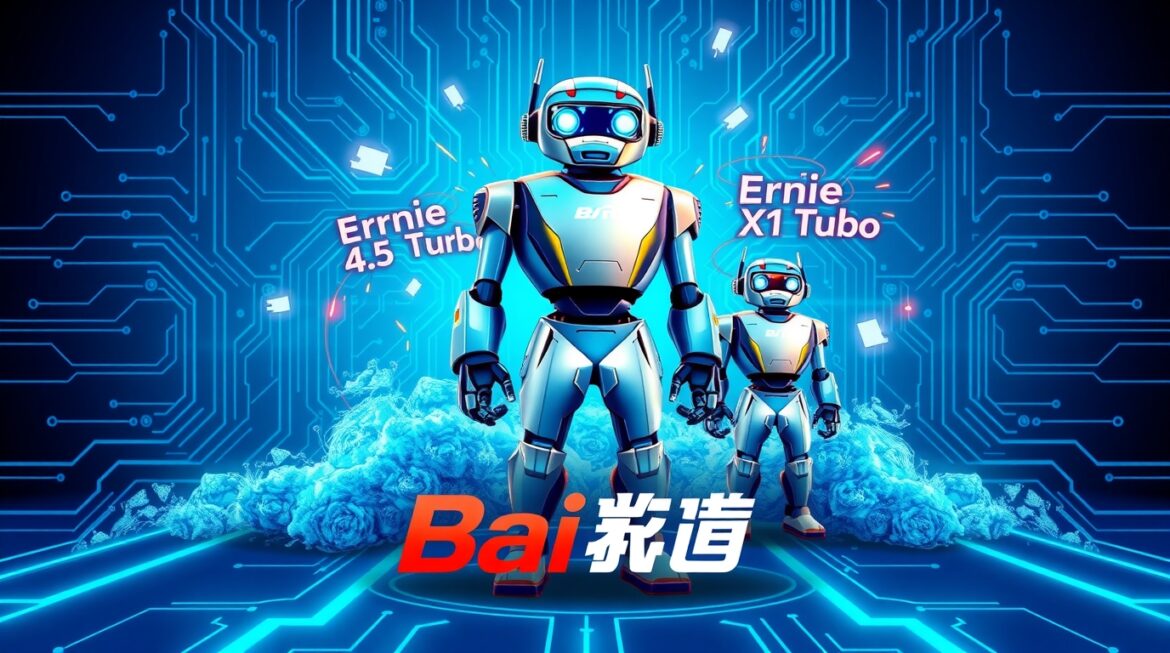Baidu Accelerates AI Advancements with Ernie 4.5 Turbo and Ernie X1 Turbo Amid Global Tech Competition
BEIJING—In a bold move to solidify its position in the rapidly evolving artificial intelligence (AI) sector, Chinese tech giant Baidu unveiled two advanced AI models, Ernie 4.5 Turbo and Ernie X1 Turbo, this week. The announcement comes amid intensifying competition in China’s AI landscape and growing scrutiny of the global AI arms race, particularly between the U.S. and China. Analysts say the launch underscores Baidu’s ambition to rival American leaders like OpenAI, Google, and Microsoft while navigating geopolitical tensions and domestic market pressures.
Next-Gen Models Target Speed, Efficiency, and Versatility
Baidu’s new models build on the foundation of its Ernie (Enhanced Representation through kNowledge IntEgration) series, which has powered the company’s AI-driven products since 2019. The Ernie 4.5 Turbo is marketed as a faster, lighter version of its predecessor, optimized for real-time applications like voice assistants, customer service automation, and low-latency industrial systems. Meanwhile, the Ernie X1 Turbo targets enterprise clients with enhanced multimodal capabilities—processing text, images, and video simultaneously—and improved computational efficiency, reducing costs for large-scale deployments.
Baidu CEO Robin Li emphasized the models’ practical applications during the launch event, stating, “These upgrades aren’t just about raw power—they’re about making AI accessible, affordable, and adaptable for businesses and developers.” The company claims Ernie 4.5 Turbo operates at 50% lower latency than previous versions, while Ernie X1 Turbo cuts training costs by 30%, critical metrics for industries like healthcare, logistics, and autonomous driving.
China’s AI Battle Royale: Alibaba, Tencent, and Startups Vie for Dominance
Baidu’s rollout arrives as China’s AI sector faces fierce competition. Rivals like Alibaba’s DAMO Academy, Tencent’s Hunyuan, and rising startups such as SenseTime and Megvii are racing to deploy cutting-edge models for cloud services, smart devices, and government contracts. According to research firm IDC, China’s AI software market is projected to grow by 43% in 2024, fueled by demand for automation and data analytics.
However, Baidu retains a unique edge. The company’s Ernie models underpin its AI cloud division, which saw revenue jump 12% year-over-year in Q1 2024, outpacing Alibaba and Tencent’s cloud growth. Baidu also benefits from its dominance in search and mapping—tools that provide vast datasets to train its AI systems. Still, challenges loom: tightening U.S. export restrictions on advanced semiconductors threaten to bottleneck China’s AI hardware development, a vulnerability Baidu acknowledged by highlighting the “optimized resource utilization” of its new Turbo models.
Global Implications: Can Baidu Compete with U.S. Titans?
While Baidu’s focus remains on China, its advancements have broader implications for the U.S.-China tech rivalry. American policymakers have raised alarms about China’s AI ambitions, citing risks to national security and economic competitiveness. The Biden administration’s recent restrictions on AI chip exports and investment in Chinese tech firms reflect this tension.
Yet Baidu’s latest models suggest progress in mitigating hardware constraints through software innovation. “China’s AI players are learning to do more with less,” said Dr. Karen Cheng, a Stanford University AI policy researcher. “Baidu’s emphasis on efficiency shows they’re adapting to U.S. sanctions, but the question is whether they can keep pace with breakthroughs like GPT-5 or Google’s Gemini without access to cutting-edge chips.”
Market Reactions and Strategic Shifts
Investors responded cautiously to Baidu’s announcement, with shares dipping 2% on the NASDAQ amid broader skepticism about Chinese tech stocks. However, industry insiders note that Baidu’s AI cloud and autonomous driving units—valued at $8 billion combined—are increasingly critical to its long-term strategy. Over 10 million developers and 45,000 enterprises now use Ernie-powered tools, including state-owned banks, automaker Geely, and electronics manufacturer Xiaomi.
Baidu also hinted at future international expansion, though U.S. sanctions and data privacy laws pose significant hurdles. For now, analysts say the company will likely focus on partnerships in Southeast Asia, the Middle East, and other regions where Chinese tech faces fewer barriers.
The Road Ahead: Innovation vs. Regulation
As Baidu pushes forward, it must balance innovation with regulatory compliance. China’s strict AI governance laws require models to align with “core socialist values,” limiting their use in sensitive areas like media and education. Meanwhile, the U.S. continues to debate frameworks for AI safety and ethics, creating a fragmented global regulatory landscape.
“Baidu’s Turbo models are impressive, but success in AI isn’t just about technology—it’s about navigating politics, ethics, and market trust,” said James Lee, a Hong Kong-based tech analyst. “Whether Baidu can challenge U.S. giants globally depends as much on Beijing’s policies as on its algorithms.”
For now, Baidu’s latest bet signals that the AI race is far from a two-horse contest—and that innovation remains as relentless as the competition driving it.


